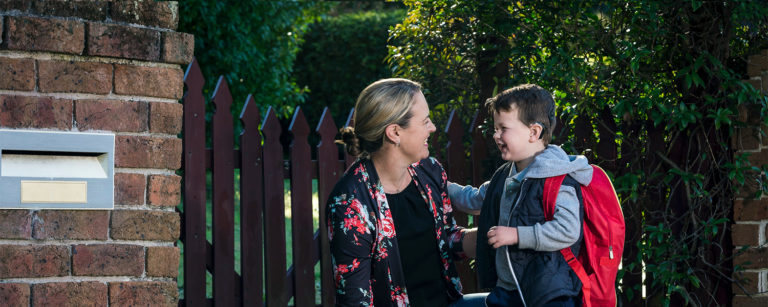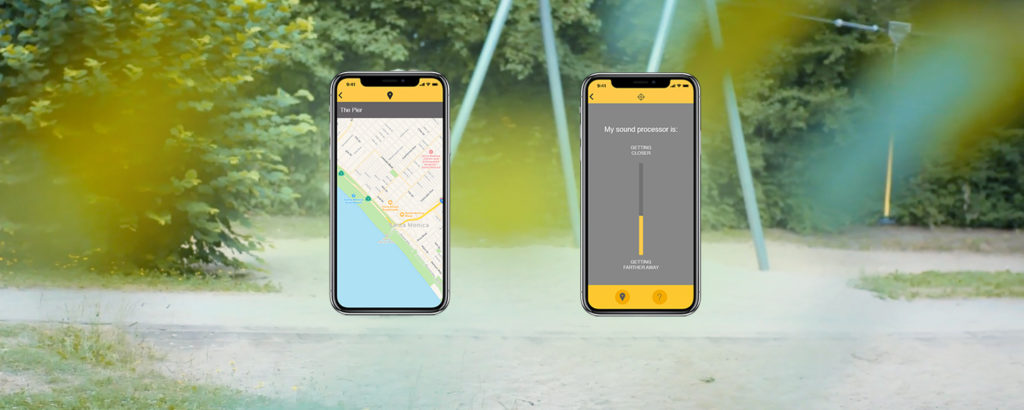The first day of preschool or reception – it’s an exciting milestone for every child. How can you lay the best foundations for your child’s success and wellbeing? We asked parents to share their top tips.
Starting school is a an important step for all little ones and their parents. We asked three parents to tell us how they made the transition less daunting and more fun for a cochlear-implanted child.
Melissa is mum to four-year-old Flynn (cover photo) who recently started preschool. Luke is preparing his daughter Harper for school next year, as is Vanessa with six-year-old Ariana. All the children have CochlearTM Nucleus® 6 and/or 7 Sound Processors for both ears.
Tip 1: Investigate the government-funded education support available
There are a range of different specialist education services for deaf children; you will need to check with your local authority what is available in your area. This might include support from a specialised teacher or private support services working within the classroom. Privately funded schools may also have similar support services available.
‘Our preschool centre went through the process of getting an itinerant [peripatetic] support person for Flynn and so he’s got funding for five hours each day that he’s there,’ says Melissa. ‘They’re there to make sure that he’s included in activities… and he’s getting the support he needs.’
Tip 2: Meet with the preschool manager or school headteacher
Get a sense for his/her understanding of your child’s needs and willingness to support both you and your child. Parents are key team members in the development of their child’s Education, Health and Care (EHC) plan.
‘The most important thing is having good staff who are open to your suggestions and feedback,’ says Melissa.
Tip 3: Check school preparation services
In mainstream schools, teachers may not have any experience of children with hearing implants. Parents should make clear that they and other hearing professionals are available to support the teacher. Ask to meet with your child’s teacher(s) to educate them on cochlear implant basics and what to do if something goes wrong. You could also request a copy of the curriculum before school begins to help you prepare.
‘I will be meeting with my daughter’s teacher before school starts to give basic info on the different parts to Ariana’s sound processors and what different coloured blinking lights mean,’ says Vanessa.

Tip 4: Educate your child’s classmates
Put together a short, age-appropriate talk or pictures to help other children understand what a cochlear implant is and how it helps your child to hear. Perhaps your child would like to be involved.
‘One of the things that has helped Harper is for the other kids to understand that she needs these sound processors to hear – like other people need glasses to see – and for them to be able to tell her if they fall off and give them back to her,’ says Luke.
Tip 5: Consider investing in a Mini Microphone 2+
‘[The Mini Mic] has made such a difference. They could see straight away Flynn’s attention was on the teacher; he was interested, and it kept him engaged. Flynn wasn’t distracted and they were amazed at how well he responded,’ says Melissa.
Tip 6: Set up a routine of checking in with your child’s teacher
‘The best tip I can give to other parents is to stay in constant communication with the teacher,’ says Vanessa. ‘Now that Ariana will be [in the] mainstream system, I plan on sending the teacher a weekly email on Fridays and just ask if there were any concerns that week and what to expect the following week.’
Tip 7: Check the seating arrangement for your child in the classroom
Ask that your child be positioned so that they are able to get the best auditory and visual information from their teacher and classmates.
‘I have asked for Ariana to be in the second row, and for the teacher to face the class when she’s speaking,’ says Vanessa.
Tip 8: Start encouraging your child to advocate for themselves
From the beginning, it is important that parents teach their children the names for the different parts of their sound processor. At school, children should be encouraged to be their own best self-advocate and be able to indicate if there is a problem with their processor or explain what they need.
‘We’ve implemented a reward system – literally a sticker chart – so that when they do group time Flynn goes and gets his Mini Mic to give it to the teacher,’ says Melissa. ‘It’s trying to start that independence because at school he’ll have to speak up for himself.’




